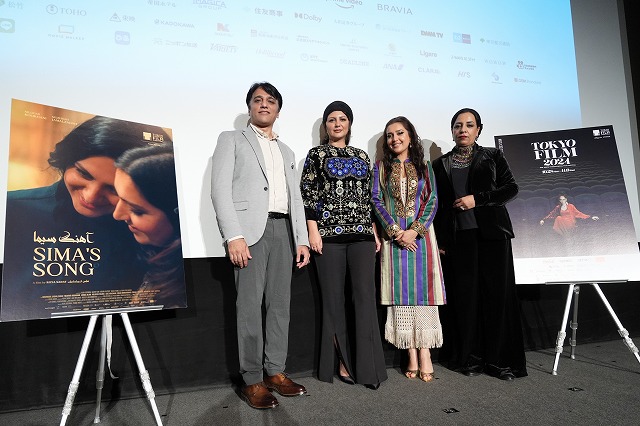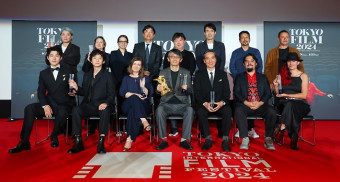
Perhaps the most momentous world premiere at the 37th Tokyo International Film Festival is Roya Sadat’s Sima’s Song, which screened publicly for the first time ever on October 31 in the festival’s Asian Focus section. The sold-out crowd sat transfixed by this drama set against the backdrop of the Soviet invasion of Afghanistan in 1978, which has rarely been depicted in such a closely observed way. After the screening, Sadat, who runs her own film production company and works tirelessly for women’s and children’s rights, took to the stage with three of the film’s actors and apologized for “making everyone sad.”
Sima’s Song centers on two young female university students, Suraya, who is from a wealthy socialist family that more or less welcomes the Soviets, at least initially; and Sima, a less affluent Muslim who is also a talented singer of traditional Sufi songs and is studying music formally. The two are best friends until the invasion sparks conflicts between rival political groups that lead to the rise of an armed anti-Soviet resistance movement that Sima eventually joins. The film is framed by a sequence depicting Suraya, now in her 60s, taking part in anti-Taliban demonstrations, thus contrasting the pre-Soviet social environment of Kabul, when women like Suraya and Sima could pursue their educational ambitions freely, to the current fundamentalist situation in the city, where women can’t even go outdoors.
During the post-screening Q&A session, at times fighting back tears, the director explained how she wanted to show how the “beauty” of music and friendship that had been destroyed by the invasion, and the resulting civil strife. “The year we decided to make this movie in Afghanistan, the Taliban regained power,” she said. “And so I was forced into exile and had to shoot the movie in Greece.”
Mozhdah Jamalzadah, who plays a younger version of Suraya and grew up outside of Afghanistan, explained to the audience that a diaspora had resulted from the rise of fundamentalism in the nation. “I had to flee just before the first civil war that was won by the Taliban,” she said. “And I want to thank every country like Japan for opening their doors to women to study and exercise their rights. It’s unfortunate we were forced to leave our country and, in many cases, our families, and then start over from zero, learn a new language and culture. But at least we regained that freedom that has since been denied to the women of Afghanistan. They have absolutely no rights. In fact, I’ve heard they now can’t even talk to one another.”
The audience seemed to be too caught up in the emotional power of the film to ask questions about it, at first simply expressing their reactions to it. One young woman said, in English, that she herself fled Afghanistan three years ago, after the Taliban regained control. “I was not born yet when the story you tell about Suraya and Sima took place, but I heard about it from my mother, and I am here today because of her,” she said. “Foreigners can’t imagine the real situation, and I want to thank you for this film. Honestly, I was very shocked. I used to work in TV [in Afghanistan] and then I worked for a Japanese company and was able to come to Japan.”
An older man in the audience addressed Sadat and the cast in Persian, Japanese, and English, saying how much he appreciated the work they did. “It’s a very important movie,” he said.
Another male viewer commented in English that 20 years earlier he had met Sadat’s younger sister, who was making a documentary. “It hasn’t gotten any easier since then,” he said. “Will it ever?” Jamalzadah responded that the sister, in fact, “was on set a lot during the filming [of Sima’s Song]. Will it ever get easier to make stories again? Remember, it’s not the people of Afghanistan who are making that impossible, it’s the politics, which makes life difficult for everyone. I lived there for only four years, but I remember how wonderful the people are. I was raised in the West, but I know that it was all the colonial powers, the English, the Russians, and, yes, the Taliban, who just made life more difficult.”
Max Grosse Majench, who plays a Russian military attaché in the movie and, according to Sadat, also contributed to the script, added, “Fifty years ago the Afghan cold war started and it still hasn’t finished. They have problems with their neighbors and can’t do anything about it.”
Sadat, who like many of the cast and crew lives in Iran, pointed out that the film’s main dialogue is Persian, which many people in Afghanistan spoke at the time the film is set. “We have a saying in my country that people should leave the movie theater with a smile on their face,” she said. “I thought we should end the film by showing women’s actions, but that was before the Taliban returned to power. As a director, I couldn’t ignore that, so we added a beginning and an ending to address the truth. Movies are not just art.”
But the film really is about art, because one of its central tragedies is that Sima’s song is silenced. Niloufar Koukhani, who plays Sima, was asked if she herself was forced to study music in exile. She revealed that, in fact, she has never studied music formally as her character did, but simply trained in singing and playing the Rabab, the national stringed instrument of Afghanistan, for the sake of the film. Everyone agreed that she learned her lessons well.
Q&A Session: Asian Future
Sima’s Song
Guests: Roya Sadat (Director/Screenplay), Mozhdah Jamalzadah (Actor), Niloufar Koukhani (Actor), Aziz Deildar (Screenplay/Actor)


























































